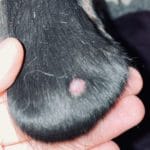Hello,
Your dog needs to be seen by a vet. I can’t tell you if the bump is even relevant to the clinical signs she is showing. She needs to be examined and a rectal exam done too. It might be allergies. Parasites. Anal sacs. Or even am impacted anal sac. These require oral antibiotics, pain meds and maybe even a drain. Please see a vet ASAP.
Hi Dr. Mag, I noticed one of our dogs shaking and scratching at their ear tonight. I looked in the ear and it is red and has dark brown ear wax on the outer ear and smells a little musty and sour. The other ear is normal, no smell and no redness. I removed the wax with cotton but do not have ear cleaner. Would I be able to purchase some cleaner from the vet? Or could you recommend one for purchase? This is for Zoey. Thank you!
Comments
I have a 14 year old female shitzu that has recently been licking her butt a ton. When I try to get close to her rear, she will either turn away from me or run and hide. When i was giving her a bath the other day, when I was trying wash her rear, she yelled. I was able to get a quick look when I was drying her off before she ran from me and there looks to be a white sore on the side of her anus. Would an antibiotic ointment or an antifungal ointment help?
Comments
Hello,
I am wondering if any of the vets or anyone who has encountered this could give me an idea what might be going on with my 10 yr old Corgi. He was coughing and spitting up water sometime after drinking water but he started coughing worse a couple days ago and sometimes phlem (white,yellow or water) comes up. He isn’t in contact with other dogs but our family had the flu and pnemonia a couple weeks ago.
Comments
Lucy is a rescue, she is female Chihuahua Mix. We notices she has not been bearing weight on the back leg. More like she was limping, bearing weight more days than other. I was thinking old age, sore muscle. We watch her closely, it seem to be getting better. Then last night on her walked something spooked her and she darted for the house. Since then she does not even extend that leg, she hobbles and wobbles on the three. I am waiting for the vet to call back for an appointment. What should I expect has for as cost for x-rays, I only ask because I assume this will be needed and when I ask an approximate cost, I was told that information is not available to give. What is the best case scenario for Lucy given her age, What is the wort I can expect? I check her leg for mobility and she is moving in all directions and does not appear to bother her. ( the leg in question) Thank you for your time and consideration in this.
Comments
Small lump on dogs ear.
My dog is around 10 years old at this point, he is a King Charles spaniel x Patterdale and has never had any major health problems. He is an extremely active and energetic dog but has a small hard red lump on his ear.
I probably noticed it a few weeks ago, as far as I can tell it hasn’t changed in size. He quite often gets thorns stuck in his skin as he likes to dive into absolutely anything to retrieve his ball, so maybe it could be an infected thorn wound? Even so, I will most likely be taking him to the vet but would like some other opinions first.
(It doesn’t seem to be giving him any discomfort)
Comments
My vet strongly suspects my cat has a nasal polyp. She has be snoring/snarling consistently for 2.5 years, but is otherwise fine. When it began, I first had a potential infection treated with two antibiotics, followed by a teeth cleaning, that yielded no issues with the teeth, and ended with a nasal flush. My vet was hoping to be able to see and grab the polyp during the flush, but couldn’t. Because she was otherwise healthy, eating, and playing, I went without treating it. Recently, she was treated for a G.I. flair up that had her not eating. She had begun not eating or moving get bowels for days. Once vomiting was added in, I took her to Metropolitan Emergency Vet. They gave her an ultrasound, saw the inflammation and gas in her abdomen, took a CBC, gave her fluids and nausea medication and sent her home a couple hours later for $800. Her bloodwork was was fine, aside from dehydration. She continued not to eat, so I brought her to my vet a day and a half later. They did an x-ray and saw the lower intestine looked aggravated. They kept her for the weekend and gave her fluids and more nausea medication. She returned to me after two days and began eating again at home. I’m awaiting the additional $600 bill for that. While being discharged, one of the docs urged me to address what she felt strongly was likely a polyp in her nasal cavity, as she believed it may now be large enough that it’s limiting her ability to smell, which may have contributed to the refusal to eat with the G.I. issue coexisting for a few days. She referred me to the specialty docs locally to have the nasal polyp removed. They are quoting me $3,195 plus. They said it would be $195 for a internal med consult, $1,500 for a “necessary” CT, and $1,500 or more for the Rhinoscopy. My vet said Lilah is otherwise a healthy 12 year old cat. I am sick with the cost, as I will need to put it all on a credit card. I have called around to multiple other specialty vets and I’m getting comparable quotes. I have had family members suggest I euthanize my cat over a nasal polyp, which I absolutely will not do. I stumbled across a Utube video of you removing a nasal polyp, so I tracked you down by name, wondering if you could help Lilah? I’m two hours from your practice, which is close enough. I’d really appreciate you getting back to me. As of now, we have a consult scheduled for 3/4, and I’m sick over the cost.
Thank you,
Diana Maginn
Comments
4 days ago my cat began acting really lethargic. She has been sleeping all day and won’t move. I offered her canned food on day 2 and she scarfed it down as well and drank water. Over the last 48 house she has declined severely. She is eey weak and has lost and extreme amount if weight despite my efforts. I have been syringe feeding her, stimulating her, administered Pedialyte as well as tried to maintain her hydration. I began subcutaneous fluids yesterday and she is still of a deep decline. I’m afraid I will lose her. She was fine the day before this started. None of my other cats are sick not have any symptoms at alll. She is 6 months old. Her name is Honey.
Comments
We brought a re-homed cat home to our house one week ago. She is 4 years old, spayed, up to date on shots and healthy. She came from a multi-cat and dog house to our single-dog house. Her previous owner says she had no problem standing up for herself against other cats and the dog (reports the other cats are much more willing to come out of hiding since she has been removed). We have noticed that she is shy and skittish, but eating and drinking. She spends most of her day hiding under a bed.
Unfortunately she refuses to use her litter box (so far preferring kids closets and under desks). We’ve taken a step back and confined her to a single room. She has a clean litter box. Food, toys and bed are at the opposite side of the room. We’ve also confined the dog to a separate part of the house
None of this is ideal. We have few doors, so keeping them apart also keeps the humans apart. I can put food or litter in another part of the house, but the cat is more likely to encounter the dog if I do that.
Thoughts?
Comments
I rescued a kitten several weeks ago. He was said to be a female and to be 4 /5 weeks old. Took him to vet next day and she turned out to be a boy around 3 weeks old. Was very sick and had fleas really bad. He is healthy now but very aggressive. I have an 8 year old cat who has never been with any other cats. The kitten attacks him to the point he cries and I can’t get him to stop attacking my adult cat. Please help
Comments
I have a question directly for Dr. Magnifico. I reached out through Jarrettsville Vet, and they directed me to Pawbly to reach Dr. Magnifico more directly:
I am reaching out after watching your YouTube videos on nasopharyngeal polyp removal. My cat Fitzgerald has all of the symptoms of this (and has for multiple years). A couple of years ago, he had a full-mouth tooth extraction due to stomatitis at University of Georgia. (I live in Atlanta.) They suspected his wheezing, occasional sneezing, snoring, and other symptoms could be due to a polyp, but, as a vet school, they refuse to check without putting him under and doing $3500 in scans. They would then have him come back in to be put under again, taken to the pet hospital, and then would extract the polyp as a costly surgery. They are not alone in the high costs of treatment in the Atlanta area.
I have seen your expertise and candidness regarding this simple diagnosis, actual procedure, and the lower cost and would like to bring my cat to your clinic. Fitzgerald has been on longer car rides in the past, so I’m sure it would be okay. I am a graduate student living on a small stipend in the city. $3500+ is not possible for me, which is why I am willing to drive 10 hours. It’s the only way I can afford to take care of Fitz’s polyp.
Please let me know how I may proceed with scheduling this. I am eager to do so as early as this month. I appreciate your time.
Best,
Christy Kinney
(and Fitzgerald)











Hello,
Is there anyway you could have her seen? The reason I ask is that we always want to differentiate between inflammation (red ears can be a sign) and infection as they take different treatments. I am at the clinic tomorrow. For now you can give Benadryl (50 mg) by mouth to see if it helps the redness. If you prefer to not leave your home we can start with an ear cleaner you can pick up here and see if this helps. If there is pain or a foul odor coming from the ears you really should have her seen ASAP. Be safe. Krista.
Hi. Thank you. I can bring her for an exam tomorrow. I will call the clinic in the morning to see what time is best. Thanks again!
Hope you are all well. Please stay safe!